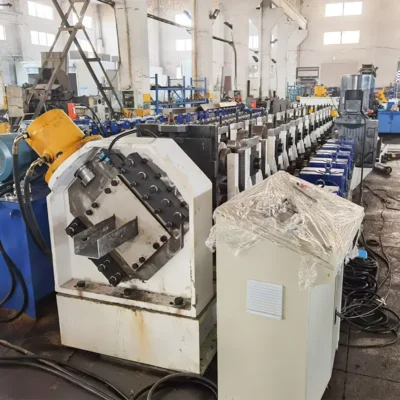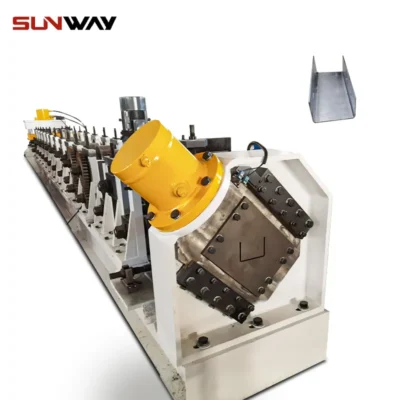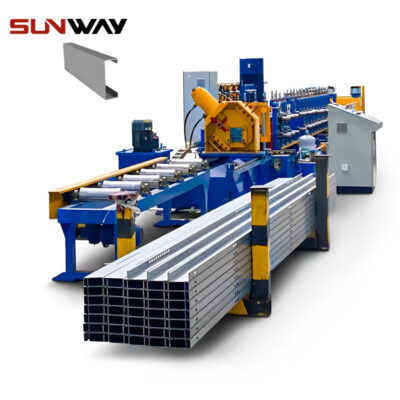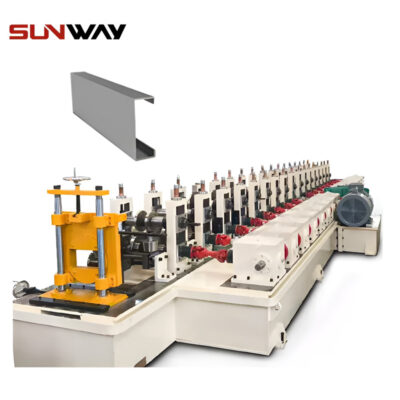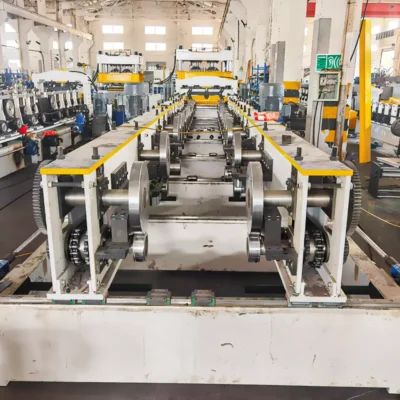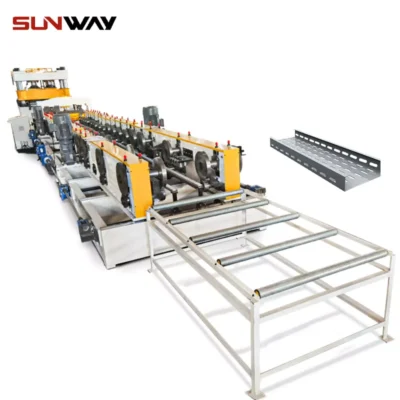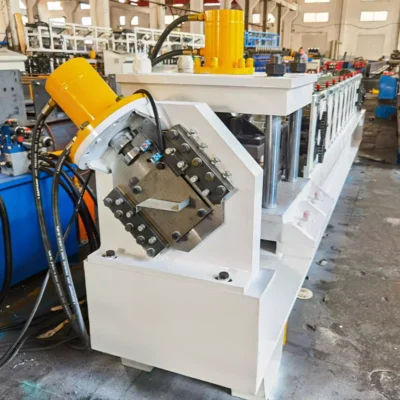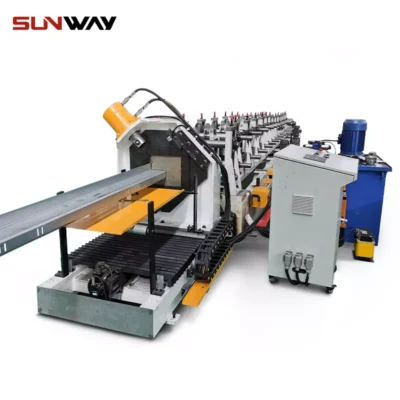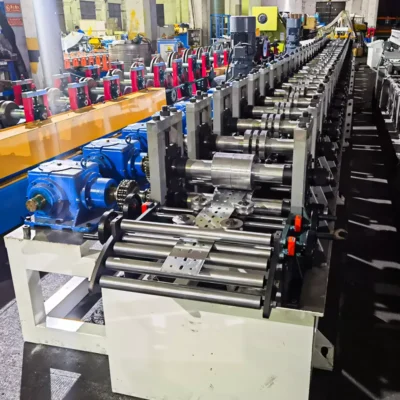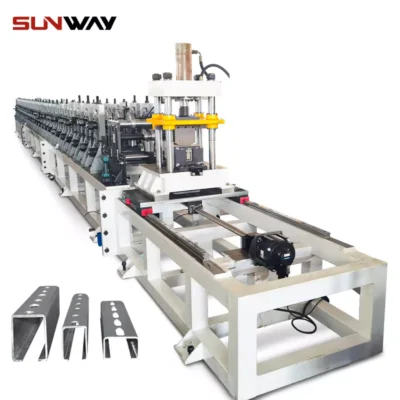The agricultural industry is the backbone of global food production, and it’s evolving rapidly to meet the demands of modern farming. As farmers adopt advanced tools and technologies to boost efficiency and sustainability, the manufacturing of agricultural equipment must keep pace. Key components like structural supports, protective covers, and storage solutions for machinery demand precision, durability, and scalability. This is where Agricultural Equipment Roll Forming Machines take center stage.
These machines are designed to produce high-quality metal profiles that are essential for farming equipment—be it for tractors, harvesters, grain storage systems, or irrigation infrastructure. By automating and streamlining the production process, Agricultural Equipment Roll Forming Machines empower manufacturers to deliver customized, cost-effective, and durable solutions to meet the needs of modern agriculture.
In this guide, we’ll explore applications, features, production workflows, pricing, innovations, market trends, and more about roll-forming machines tailored for agricultural equipment. We’ll also discuss why Wuxi Sunway Machinery leads the industry with cutting-edge solutions.
What is an Agricultural Equipment Roll Forming Machine?
An Agricultural Equipment Roll Forming Machine is a specialized manufacturing system designed to produce metal profiles used in farming equipment and infrastructure. These machines shape raw materials—such as galvanized steel, aluminum, or stainless steel—into precise and durable components required for agricultural applications.
Components typically produced include:
- Structural Frames: For tractors, harvesters, and other heavy farming machinery.
- Protective Covers: Shields for machinery to protect against dust, debris, and weather conditions.
- Irrigation Channels: Profiles for water management systems in fields.
- Storage Solutions: Components for grain silos, barns, and other agricultural storage systems.
- Fencing Systems: Durable profiles for livestock enclosures and perimeter fencing.
Whether it’s a small family farm or a large industrial agricultural operation, these machines enable manufacturers to meet the unique needs of the farming industry with precision and efficiency.
Applications of Agricultural Equipment Roll Forming Machines
The versatility of Agricultural Equipment Roll Forming Machines allows them to serve a wide variety of applications in the agricultural sector. Let’s take a closer look:
1. Tractors and Harvesters
- Use Case: Producing structural frames, engine covers, and other metal components for heavy farming machinery.
- Why It Matters: Ensures durability and precision for machines that operate in rugged environments.
2. Grain Silos
- Use Case: Fabricating corrugated panels and structural supports for large grain storage systems.
- Why It’s Crucial: Provides weather-resistant and long-lasting storage solutions for crops.
3. Irrigation Systems
- Use Case: Manufacturing channels, pipes, and supports for water management systems.
- Why It’s Important: Enables efficient and sustainable irrigation practices in agriculture.
4. Livestock Fencing
- Use Case: Producing durable metal profiles for fencing and enclosures for livestock management.
- Why It’s Relevant: Ensures the safety and containment of animals while withstanding harsh outdoor conditions.
5. Agricultural Buildings
- Use Case: Fabricating structural components for barns, greenhouses, and storage sheds.
- Why It’s Useful: Provides sturdy and customizable solutions for agricultural infrastructure.
6. Specialty Farming Equipment
- Use Case: Manufacturing custom profiles for niche farming tools such as seeders, planters, and sprayers.
- Why It’s Exciting: Supports innovation in farming technology by enabling precise component production.
Key Features of Wuxi Sunway Agricultural Equipment Roll Forming Machines
Wuxi Sunway Machinery has redefined roll-forming technology to meet the specific demands of agricultural manufacturing. Their Agricultural Equipment Roll Forming Machines are packed with advanced features to ensure precision, efficiency, and reliability. Here’s what makes them stand out:
1. Multi-Profile Capability
- What It Supports: Machines can produce a wide range of profiles, from structural frames to corrugated panels.
- Why It’s Beneficial: Allows manufacturers to serve diverse applications with a single machine.
2. High-Speed Production
- Performance: Capable of producing up to 30–50 meters of profiles per minute, depending on the material and complexity.
- Why It’s Relevant: Meets the high-volume demands of agricultural equipment production.
3. Material Compatibility
- Supported Materials:
- Galvanized steel
- Stainless steel
- Aluminum
- Why It Matters: Ensures the production of lightweight, corrosion-resistant, and durable components.
4. Integrated Cutting and Punching
- What It Offers: Built-in systems for cutting profiles to length and punching holes or slots as needed.
- Why It’s Essential:
- Reduces secondary operations.
- Ensures consistency and precision across all components.
5. Customizable Tooling
- What It Allows: Quick-change tooling systems for producing custom profiles tailored to specific equipment designs.
- Why It’s Critical: Supports flexibility for manufacturers serving specialized agricultural markets.
6. IoT Integration
- What It Enables: Real-time monitoring, data collection, and automated adjustments via IoT-enabled sensors.
- Why It’s Game-Changing:
- Enhances production efficiency.
- Minimizes material waste and errors.
- Facilitates predictive maintenance to avoid downtime.
7. Corrosion-Resistant Coatings
- What It Provides: Machines equipped to process materials with anti-corrosion coatings for outdoor applications.
- Why It’s Important: Ensures the longevity of components used in harsh agricultural environments.
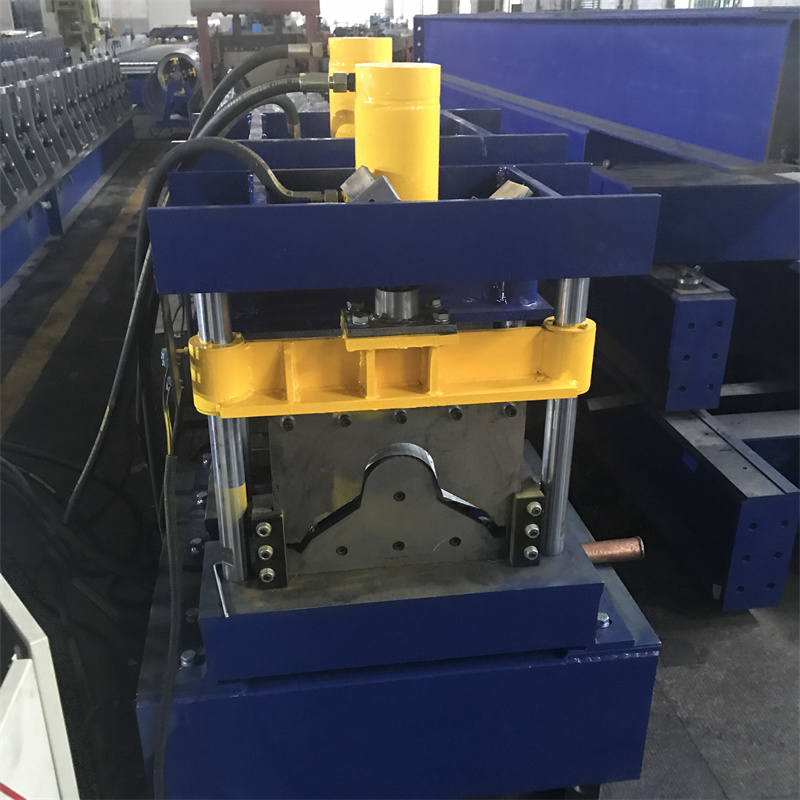
Production Workflow of an Agricultural Equipment Roll Forming Machine
The production process for agricultural components is designed to deliver efficiency, scalability, and precision. Here’s a step-by-step overview:
1. Material Loading
- Metal sheets or coils are placed on the machine’s decoiler, which prepares the material for processing.
2. Straightening
- A leveling system ensures the material is flat and defect-free before entering the roll-forming section.
3. Roll Forming
- The material passes through a series of rollers that incrementally shape it into the desired profile.
4. Punching
- Integrated punching systems add holes, slots, or other features required for assembly or functionality.
5. Cutting to Length
- Profiles are cut to precise lengths using hydraulic or laser cutting systems.
6. Quality Inspection
- Every component is inspected for dimensional accuracy, surface finish, and compliance with agricultural equipment standards.
7. Stacking and Packaging
- Finished components are stacked and prepared for transportation to assembly lines or storage facilities.
Pricing of Agricultural Equipment Roll Forming Machines
The cost of an Agricultural Equipment Roll Forming Machine depends on its features, production capacity, and customization options. Below is a general pricing guide for 2025:
| Machine Type | Capabilities | Price Range (USD) |
|---|---|---|
| Standard Machines | Basic profile production | $150,000–$250,000 |
| Advanced Machines | High-speed and multi-profile output | $250,000–$400,000 |
| Customizable Machines | Including punching, IoT, and automation | $400,000–$600,000 |
For detailed pricing and financing options, contact Wuxi Sunway Machinery.
Technological Innovations in Agricultural Equipment Roll Forming Machines
The agricultural sector is embracing innovation, and Agricultural Equipment Roll Forming Machines are no exception. Here are the latest advancements transforming the industry:
1. AI-Driven Quality Assurance
- What It Does: Uses artificial intelligence to monitor production and detect defects in real time.
- Why It’s Significant:
- Ensures consistent quality across all components.
- Reduces waste by identifying issues early.
2. Modular Tooling Systems
- What It Enables: Quick changes between tooling setups for different profiles.
- Why It’s Practical:
- Supports both high-volume production and custom orders.
- Reduces downtime, boosting operational efficiency.
3. Energy-Efficient Operations
- What It Provides: Machines equipped with energy-saving motors and optimized workflows.
- Why It’s Essential:
- Lowers electricity consumption during production.
- Aligns with sustainability goals in agriculture.
4. Digital Twin Technology
- What It Offers: Virtual simulations of the roll-forming process to optimize machine settings.
- Why It’s Game-Changing:
- Speeds up setup for new profiles.
- Enables manufacturers to test designs virtually before committing resources.
FAQs About Agricultural Equipment Roll Forming Machines
| Question | Answer |
|---|---|
| Can these machines produce custom profiles? | Yes, Wuxi Sunway machines support fully customizable tooling for bespoke designs. |
| What is the average production speed? | Machines can produce up to 30–50 meters per minute, depending on the material and profile complexity. |
| Do these machines support eco-friendly materials? | Absolutely! They are compatible with recyclable materials like aluminum and galvanized steel. |
| What maintenance is required? | Regular maintenance includes lubrication, roller inspection, and software updates. |
| Is training provided with the machine? | Yes, Wuxi Sunway offers comprehensive training and after-sales support for all customers. |
Market Trends for Agricultural Equipment Roll Forming Machines in 2025
The demand for Agricultural Equipment Roll Forming Machines is growing rapidly, fueled by a combination of technological advancements, sustainability goals, and the need for efficient production processes. Here are the key market trends shaping the industry:
1. Precision Farming and Smart Equipment
- The Trend: The rise of precision farming technologies has created a demand for equipment with highly accurate and durable components.
- Machine Impact:
- Roll-forming machines produce precisely engineered profiles for GPS-guided tractors, automated seeders, and smart irrigation systems.
- Customizable tooling supports the creation of innovative designs for modern farming applications.
2. Growth in Sustainable Agriculture
- The Push: Governments and organizations worldwide are promoting sustainable farming practices to reduce environmental impact.
- Why It’s Relevant:
- Machines process eco-friendly materials like recyclable aluminum and corrosion-resistant steel.
- Energy-efficient production workflows align with sustainability goals.
3. Expansion of Infrastructure in Emerging Markets
- The Opportunity: Countries in Asia, Africa, and Latin America are investing heavily in agricultural infrastructure.
- How Machines Help:
- Provide affordable and durable components for grain silos, irrigation channels, and fencing systems.
- Enable manufacturers to meet the growing demand in these regions with scalable production.
4. Modular and Customizable Equipment Designs
- The Shift: Farmers are seeking modular equipment systems that can adapt to various tasks and terrains.
- Machine Contribution:
- Roll-forming machines produce interchangeable components that fit modular designs.
- Custom profiles allow manufacturers to cater to niche markets with unique requirements.
5. Automation in Manufacturing
- The Push: Manufacturers are turning to automation to reduce costs, increase production speed, and minimize human error.
- Why It’s Important:
- IoT-enabled roll-forming machines offer real-time monitoring and automated adjustments.
- AI-driven quality control ensures consistent output without manual intervention.
Sustainability Advantages of Agricultural Equipment Roll Forming Machines
As sustainability becomes a priority across industries, Agricultural Equipment Roll Forming Machines are helping manufacturers achieve their eco-friendly goals. Here’s how:
1. Efficient Material Utilization
- The Feature: Precision rollers shape materials with minimal waste.
- Why It Matters:
- Conserves resources by reducing scrap.
- Lowers raw material costs for manufacturers.
2. Support for Recyclable Materials
- What It Enables: Machines process recyclable materials like aluminum and galvanized steel.
- Environmental Impact:
- Promotes a circular economy by enabling material reuse.
- Reduces dependency on virgin raw materials.
3. Energy-Efficient Operations
- The Innovation: Advanced motors and optimized workflows reduce energy consumption during production.
- Why It’s Significant:
- Lowers the carbon footprint of manufacturing processes.
- Aligns with global sustainability standards.
4. Durability and Longevity
- The Result: Components produced by roll-forming machines are highly durable and resistant to wear and tear.
- Why It’s Sustainable:
- Extends the lifespan of farming equipment, reducing waste from frequent replacements.
- Supports sustainable farming practices by providing reliable infrastructure.

Real-World Examples of Agricultural Equipment Roll Forming Machines in Action
To better understand the impact of Agricultural Equipment Roll Forming Machines, let’s explore some real-world scenarios:
1. Tractor Manufacturing
- Scenario: A global tractor manufacturer needs structural frames and protective covers for its new line of smart tractors.
- Machine Contribution:
- Produces high-strength steel frames capable of withstanding heavy loads.
- Crafts weather-resistant covers that protect internal components from dust and moisture.
- Enables customized designs to differentiate products in a competitive market.
2. Grain Storage Systems
- Scenario: A farming cooperative is setting up large-scale grain silos to store crops post-harvest.
- Machine Contribution:
- Produces corrugated panels and structural supports for silo construction.
- Ensures corrosion resistance for long-term durability in outdoor environments.
- Delivers high-volume production to meet tight installation deadlines.
3. Livestock Management
- Scenario: A ranching company is upgrading its fencing systems to improve livestock safety and containment.
- Machine Contribution:
- Crafts durable and rust-resistant profiles for perimeter fencing.
- Supports the production of modular panels for quick assembly and replacement.
- Offers customizable designs for different types of livestock.
4. Irrigation Infrastructure
- Scenario: A government-backed project is implementing irrigation channels in arid regions to enhance water distribution.
- Machine Contribution:
- Produces precise profiles for irrigation channels and supports.
- Crafts lightweight, easy-to-install components for remote areas.
- Ensures longevity with materials designed to resist water corrosion.
Global Standards Compliance for Agricultural Equipment
Agricultural components must meet strict international standards to ensure safety, performance, and sustainability. Wuxi Sunway Agricultural Equipment Roll Forming Machines are designed to produce components that comply with these standards:
| Standard | Region | Requirement |
|---|---|---|
| ISO 12100 | Global | Covers safety standards for machinery and equipment. |
| EN 1090-2 | Europe | Specifies technical requirements for structural steel components. |
| ASTM A653 | North America | Governs the quality of galvanized steel used in agricultural applications. |
| CE Marking | Europe | Certifies compliance with EU safety and environmental regulations. |
| AS/NZS 4600 | Australia/New Zealand | Provides standards for cold-formed steel structures. |
By using Wuxi Sunway Roll Forming Machines, manufacturers can confidently produce farming equipment components that meet these global requirements.
Expanded FAQ Section for Agricultural Equipment Roll Forming Machines
| Question | Answer |
|---|---|
| What is the typical lead time for machine delivery? | Lead times range from 6–12 weeks, depending on customization requirements. |
| Can these machines handle high-strength materials? | Yes, Wuxi Sunway machines are designed to process materials like stainless steel and high-grade aluminum. |
| Do these machines support modular equipment designs? | Absolutely! Machines can produce interchangeable components for modular farming systems. |
| What is the average machine lifespan? | With proper maintenance, Wuxi Sunway machines can last 15–25 years or more. |
| Are training and installation included? | Yes, Wuxi Sunway provides comprehensive training and installation services for every machine sold. |
| Do these machines comply with global safety standards? | Yes, they are designed to meet international standards like ISO, CE, and ASTM certifications. |
| What is the production capacity of these machines? | Machines can produce up to 30–50 meters of profiles per minute, depending on the material and complexity. |
Why Wuxi Sunway Machinery is the Leading Manufacturer for Agricultural Equipment Roll Forming Machines
Wuxi Sunway Machinery has earned its reputation as a global leader in roll-forming technology. Here’s why manufacturers worldwide trust Wuxi Sunway:
- Unmatched Expertise: Decades of experience in crafting roll-forming solutions for diverse industries, including agriculture.
- Global Presence: Trusted by clients across Asia, Europe, the Americas, and beyond.
- Cutting-Edge Innovations: Features like AI-driven quality control, IoT integration, and modular tooling set Wuxi Sunway apart.
- Eco-Friendly Solutions: Machines are designed with sustainability in mind, supporting recyclable materials and energy-efficient operations.
- Reliable Support: Comprehensive training, installation, and after-sales services ensure seamless operations for all customers.
Conclusion: Transforming Agriculture with Precision Manufacturing
The Agricultural Equipment Roll Forming Machine is more than just a tool—it’s a solution to the challenges of modern farming. By enabling the efficient production of durable, high-quality components, these machines are helping manufacturers support the agricultural sector’s shift toward efficiency, sustainability, and innovation.
Looking to transform your agricultural manufacturing process? Partner with Wuxi Sunway Machinery today and explore their state-of-the-art roll-forming solutions. Together, let’s cultivate a better future for agriculture—one profile at a time!

